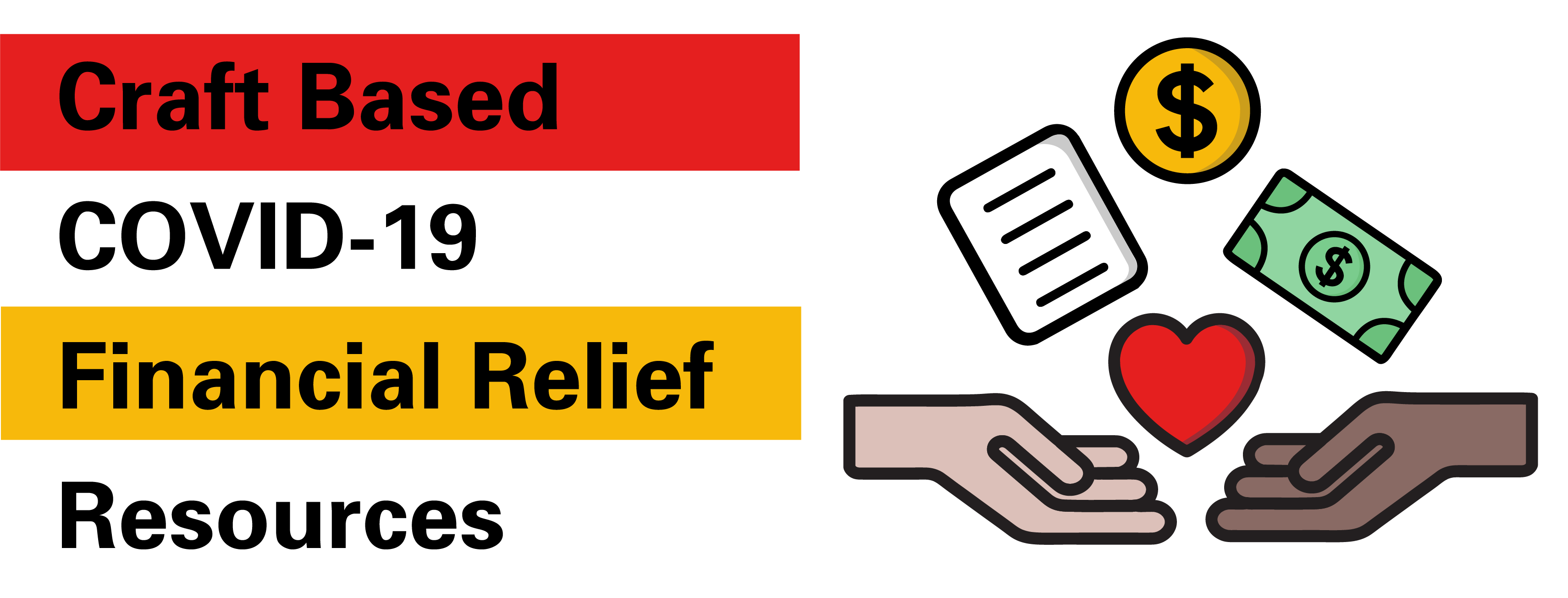The theme of 2020 could arguably be the year of planning, pivoting, and going with the ebbs and flows. As a craft artist or organization, there is a lot of financial data to take in and the federal information is always adapting.
The Canadian Crafts Federation has gathered and summarized the most recent news and relevant financial support for craft artists and organizations as the government continues to refine emergency programs to support the cultural sector.
This document outlines the continuation and expansion of Canada Recovery Benefit, Canada Emergency Wage Subsidy, Canada Emergency Business Account, Regional Relief and Recovery Fund and a newly adapted Canada Emergency Rent Subsidy. As well, there are two newly announced programs: the Lockdown Support and the Highly Affected Sectors Credit Availability Program (HASCAP). Without the full program details of HASCAP, the funding may or may not support artist and arts organization. However, we felt that you may be interested in learning about the announcement of this program.
Please review the following information to see if you or your organizations qualify for the new or expanded support.
New Announcements for the Previous Programming: CRB, CEWS, CEBA, RRRF
The Canada Recovery Benefit (CRB) allows workers who are not eligible for EI to access income support through new Recovery Benefits.
Announced September 24, 2020
The Canada Emergency Wage Subsidy (CEWS) has been extended to June 2021 and will remain at the same rate of 65% of eligible wages until December 19, 2020. Use the online resources to see if you’re eligible and what subsidy rates apply for you. The rate is based on revenue drop and on the periods you are applying to.
The government is proposing to increase the maximum wage subsidy rate to 75 per cent for the period beginning December 20, 2020 and to extend this rate until March 13, 2021.
Announced November 19, 2020
The Canada Emergency Business Account (CEBA) program will soon be expanded, allowing qualifying businesses to access an additional interest-free $20,000 loan, in situations where there is need. Half of this additional amount, up to $10,000, would be forgivable if the loan is repaid by December 31, 2022
Announced October 9, 2020
The Regional Relief and Recovery Fund (RRRF) in support of local tourism businesses, the government is proposing a top-up of up to $500 million, on a cash basis, to Regional Development Agencies and the Community Futures Network of Canada, bringing total funding to over $2.0 billion in this fund. The government will earmark a minimum of 25 per cent of all the Fund’s resources to support local tourism businesses, representing $500 million in program support through June 2021.
You must first apply for other federal support measures such as the Canada Emergency Business Account benefit, the Wage Subsidy benefit and the Commercial Rent assistance for small businesses, among others.
Each of these regional agencies has a different program/application process, so be sure to review what loans or grants your business could locally tap into.
Atlantic Canada: https://www.canada.ca/en/atlantic-canada-opportunities/campaigns/covid19/rrrf.html
Southern Ontario: http://www.feddevontario.gc.ca/eic/site/723.nsf/eng/02588.html?OpenDocument
Northern Ontario: http://fednor.gc.ca/eic/site/fednor-fednor.nsf/eng/h_fn04591.html
Quebec: https://dec.canada.ca/eng/programs/regi/coronavirus-rrrf/index.html
NWT, Yukon and Nunavut: https://www.cannor.gc.ca/eng/1589295515132/1589295564439
Western Canada: https://www.wd-deo.gc.ca/eng/20059.asp
Announced October 2, 2020
The new Canada Emergency Rent Subsidy (CERS) will provide rent and mortgage support directly to tenants and property owners until June 2021. The new rent subsidy will support businesses, charities, and non-profits that have suffered a revenue drop by providing support up to a maximum of 65 percent of eligible expenses until December 19, 2020. Claims can be made retroactively to September 27, 2020. The portal for CERS is not yet available but will be made available soon.
The government is proposing to extend the current subsidy rates of the Canada Emergency Rent Subsidy for an additional three periods. This means a base subsidy rate of up to 65 per cent will be available on eligible expenses until March 13, 2021.
Announced November 5, 2020
Newly Announced Programs
Supporting the live events and arts sectors is expected to benefit a broad diversity of artists and freelance cultural workers, such as performing artists and live event workers, including those from Indigenous, deaf and disability and official language minority communities. This new funding will aim to support arts and culture workers and projects across the country.
To support the planning and presentation of COVID-19-safe events and the arts — including both live and digital — and to provide work opportunities in these sectors, the government will provide $181.5 million in 2021-22 to the Department of Canadian Heritage and the Canada Council for the Arts to expand their funding programs.
This includes a one-year renewal of funding provided in Budget 2019 for the Building Communities through Arts and Heritage program, the Canada Arts Presentation Fund and the Canada Music Fund.
The Highly Affected Sectors Credit Availability Program (HASCAP) is a newly announced program for the hardest-hit businesses, including those in sectors like tourism and hospitality, hotels, arts and entertainment. This stream would offer 100 per cent government-guaranteed financing for heavily impacted businesses, and provide low-interest loans of up to $1 million over extended terms, up to ten years. Rates will be lower than those offered in Business Credit Availability Program (BCAP) and beneath typical market rates for hard-hit sectors.
Announced November 30, 2020
The new Lockdown Support will provide an additional 25 per cent through the Canada Emergency Rent Subsidy for qualifying organizations that are subject to a lockdown and must shut their doors or significantly restrict their activities under a public health order issued under the laws of Canada, a province or territory (including orders made by a municipality or regional health authority under one of those laws). Combined, this will mean that hard-hit businesses subject to a lockdown could receive rent support of up to 90 per cent.
Announced November 5, 2020

